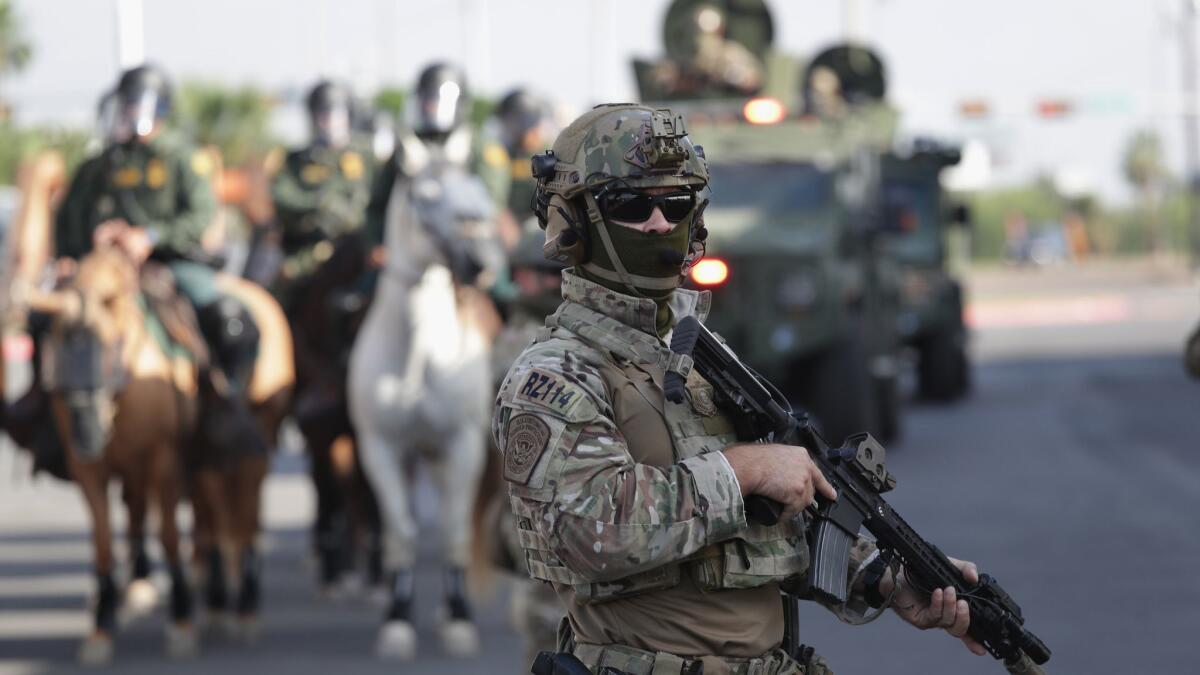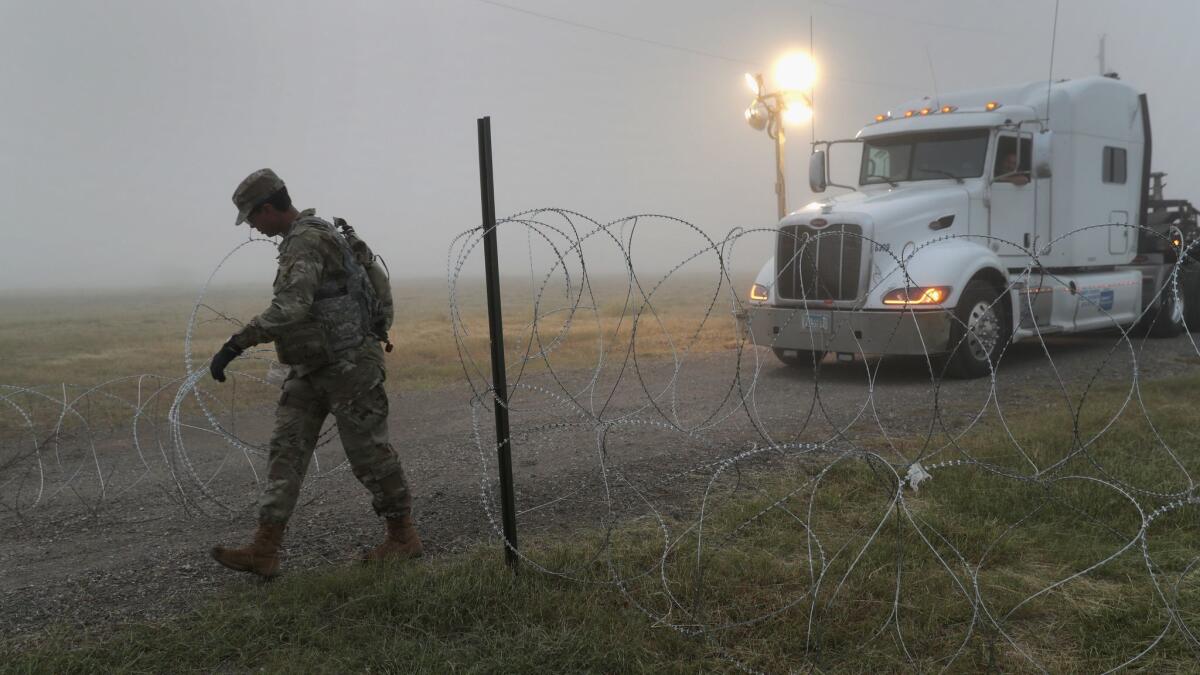‘Caravan-related exercise’ on the Texas border canceled because of election day concerns

- Share via
Reporting from McAllen, Texas — U.S. troops have been climbing, armed, from helicopters onto the borderlands of south Texas this week, dozens riding in on heavy military vehicles, stringing concertina wire and erecting temporary structures near border bridges where Border Patrol agents train in riot gear.
President Trump deployed hundreds of troops to Texas last week as the first stage of Operation Faithful Patriot, an effort to fortify the border before a caravan of at least 3,500 immigrants arrives in the coming weeks.
Seeing uniformed troops on the border isn’t new: National Guard units were sent to the border last spring, and more than 2,100 remain. But National Guard troops were instructed to remain low-profile, supporting agents but not pursuing or detaining immigrants. This week, the Pentagon said more than 7,000 active-duty troops will eventually have a far more visible role in supporting the border operation, with the largest group — 2,600 — in Texas, where preparations with the Border Patrol have stirred controversy and concern.
On Tuesday, election day, Border Patrol officials in El Paso canceled a “crowd-control exercise” planned near a border bridge in the historic Chihuahuita neighborhood half an hour before it was scheduled to begin. El Paso is home to Rep. Beto O’Rourke, the Democratic challenger to Sen. Ted Cruz in one of the country’s most closely watched races.
A Border Patrol spokesman said the “joint caravan-related exercise” was postponed “out of an abundance of caution” and “due to inaccurate reporting that caused unneeded confusion in border communities.”
“We will continue training exercises in the following days as necessary to ensure border security,” the spokesman said in a statement.
Texas Secretary of State Rolando Pablos, an El Paso native, said he called Border Patrol officials ahead of the exercise to ensure that it would not conflict with voting, a spokesman said. Pablos later released a statement thanking the Border Patrol for canceling the exercise.
“This will help ensure that voters in South El Paso can go cast their votes without concerns of delays or interruptions at the polling sites,” the statement said.

Border Patrol officials also received complaints from Texas lawmakers and the American Civil Liberties Union soon after they announced the exercise late Monday.
“It shouldn’t have taken outrage by us, congresspeople and the community for the Border Patrol to know they were being manipulated for political gain,” said Terri Burke, executive director of the ACLU of Texas.
Burke condemned the exercise as a political “stunt” and a form of “intimidation.” Though the ACLU’s conversations with Border Patrol officials were fruitful Tuesday, she said, “We realize we’re going to have to be constantly vigilant about this.”
Similar exercises involving Border Patrol agents in riot gear, some on horseback, have been held in the last week at border bridges in Brownsville and Hidalgo. Military officials have not held briefings at the border but they posted photos online this week of troops in Texas stringing concertina wire, flying Black Hawk helicopters into nearby Edinburg and setting up camp at a border crossing in Donna, where they began to erect a temporary structure Tuesday.
South Texas Border Patrol officials referred questions about the operation to counterparts in Washington, but also posted photos online of agents working with troops. Border Patrol Rio Grande Valley Sector Chief Manuel Padilla, who is overseeing the operation from Brownsville to El Paso, declined to comment on the deployment. But he has been tweeting photos of troops working with Border Patrol agents, including soldiers from Ft. Sam Houston in San Antonio and Ft. Riley in Kansas.
“Providing military support to the @DHSgov & @CBP to secure the southern border of the United States. #HOOAH,” Padilla tweeted this week alongside photos of a convoy of humvees headed to the Rio Grande Valley.
South Texas is overwhelmingly Democratic but moderate and religious, home to many military veterans. Some who support Trump said they welcomed the troops.
“We have a porous border,” said Charles Cooke, 73, a retired Army veteran who has lived in McAllen for a decade and sees the latest influx of immigrants as an “invasion.”
“We have people coming from Vietnam, Chad, from all over the world, from some Middle Eastern countries. People need to stop and get in line like the majority of people used to do,” he said.
Though he later recanted the statement, Trump said he told the military that if immigrants throw rocks, troops should respond as though the rocks were rifles. Cooke said that makes sense to him. Many in the caravan are traveling with children, and he said that’s a risk they take.
Cooke echoed fears Trump has expressed, that immigrants arriving at the border are exploiting political asylum, making false claims and then disappearing before immigration judges decide their cases.
“They’re coming to the border, being coached what to say, they apply for asylum, get their ankle bracelets and never show up,” he said.
But other border residents are upset by the arrival of troops.
They see the deployment as part of Border Patrol’s increased militarization. After military helicopters landed and armed troops climbed out near residents — including late Tuesday near the National Butterfly Center during an annual festival — some posted photos and video online criticizing the deployment. Marianna Trevino-Wright, the center’s executive director, posted a photo of a soldier stringing concertina wire on her Facebook page labeled, “Our home is not a war zone.”
“The RGV is being invaded,” Frank Zezulka of Mission, Texas, posted on Facebook, referring to the Rio Grande Valley. “We are officially at war.”
John Michael Torres, a spokesman for La Union del Pueblo Entero, a Rio Grande Valley community services group, discussed the helicopter photos and the deployment with local volunteers.
“People say this is aggression toward people who live along the border and immigrants. It’s really heartbreaking that it’s come to this,” Torres said.
Torres worries that Trump will get funding to extend the deployment year round. He said the troops’ presence near the bridge is intimidating not just to recent immigrants, but to those who have settled in Texas.
“It’s like pointing a gun at our own families,” he said.
molly.hennessy-fiske@latimes.com
More to Read
Sign up for Essential California
The most important California stories and recommendations in your inbox every morning.
You may occasionally receive promotional content from the Los Angeles Times.














